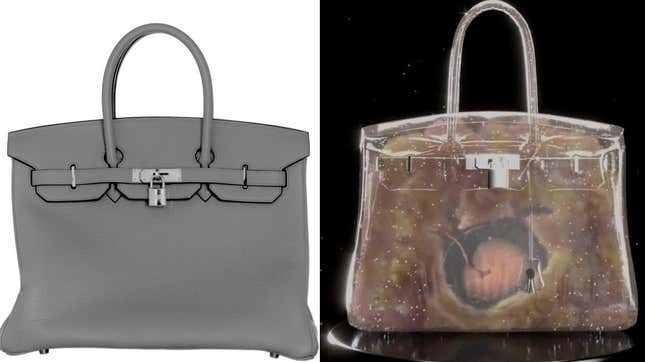
Look to your left, and see an image of a famed, extremely expensive luxury Birkin-brand handbag. On your right, is a non-fungible token, a digital image whose rights of ownership are recorded on a blockchain. On Wednesday, a jury in New York decided that these MetaBirkin NFTs were indeed a big ripoff of the famous Birkin brand bags.
Last year, French luxury brand Hermès sued the NFT maker Mason Rothschild, who legally goes by Sonny Estival according to court docs, arguing that the creator’s “MetaBirkins” NFT collection was ripping off the Birkin bag trademark in an attempt to “get rich quick” by using the Birkins brand image for his non fungible tokens. Hermès argued this diluted their brand, especially with Rothschild’s plan to open up a specific “MetaBirkins” online store and a planned “Build-a-MetaBirkin” contest.
The Financial Times reported that after two days of deliberation, the jury came to a verdict that will force Rothschild to pay $110,000 for intellectual property infringement and another $23,000 for squatting on the Birkin domain name, which the handbag maker argued led to brand confusion.
Rothschild has made this case about more than just his own NFT project. As quoted by CoinDesk, the MetaBirkins creator argued the project was an “experiment” and an artistic expression of the values of luxury brands. He even asked the jury a very pertinent question: “Is it the image or the actual product.”
The decision could be a major plot point for other cases actively dealing with trademark, copyright, and NFTs. The decision could set a precedent for the numerous other NFT projects that have incorporated real world images, especially trademarked brand images, into their work. It could set the tone for all other projects, declaring they’re more of a commodity than an artistic expression.
Hermès told FT that while it supports artistic expression, it needed to “protect… the integrity of its brand.”
On Twitter, Rothschild lamented the decision and lamented “what happened today will continue to happen if we don’t continue to fight.”
Gizmodo reached out to Hermès’ legal team for comment, but we did not immediately hear back.
The NFTs were first made available in December, 2021 with an initial limited release of 100 tokens that took the same image of a Birkins handbag and then covered them in various types of fur.
After Heremes issued a cease and desist to the NFT collection that same month, Rothschild took to Twitter to release a public statement arguing his project was a “playful abstraction” of the existing Birkins brand and a “commentary on fashion’s history of animal cruelty, and its current embrace of fur-free initiatives and alternative textiles. “While I am sorry if you were insulted by my art, as an artist, I will not apologize for creating it,” the creator said.
Rothschild put his work on the same level as other artists who have used brand imagery in their art, such as famed painter Andy Warhol who used images of Campbell’s soup cans and Marilyn Monroe in his work. Last year Rothschild tweeted an image of a letter an exec from Campbell Soup Company sent to Warhol at the height of his career.
A regular ol’ Birkin bag sells anywhere from $9,000 to $500,000. By the time the NFT collection’s listing on digital marketplace OpenSea was taken down in January of last year, it had already made over $1 million in sales, according to a report from Reuters. In court documents, Hermes claimed the project reached about $1.1 million in sales, though Rothschild has said he only made $125,000 from initial sales plus royalties.
Rothschild’s attorneys asked whether the ultra-wealthy who could afford a Birkin bag would really be confused by a fake, digital simulacrum. According to The New York Times, the NFT creator’s attorney Rhett Millsaps II argued that art needs context, and Birkins were a “cultural symbol of rarefied wealth and status.”

